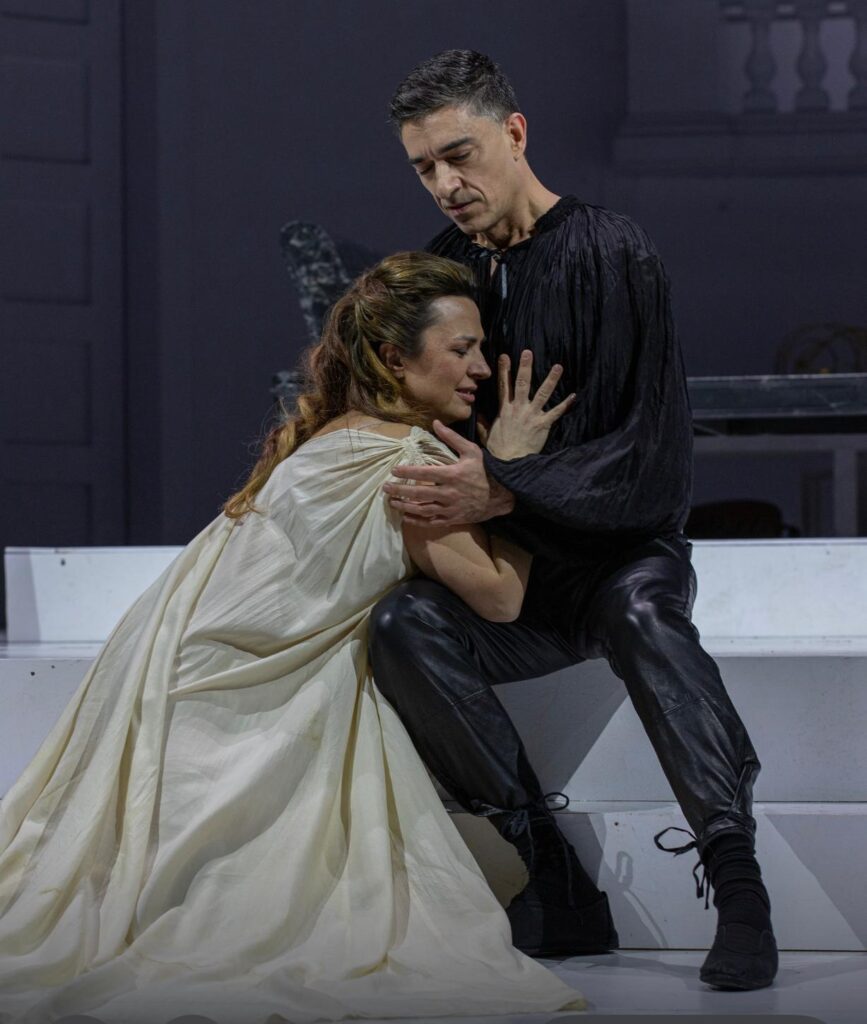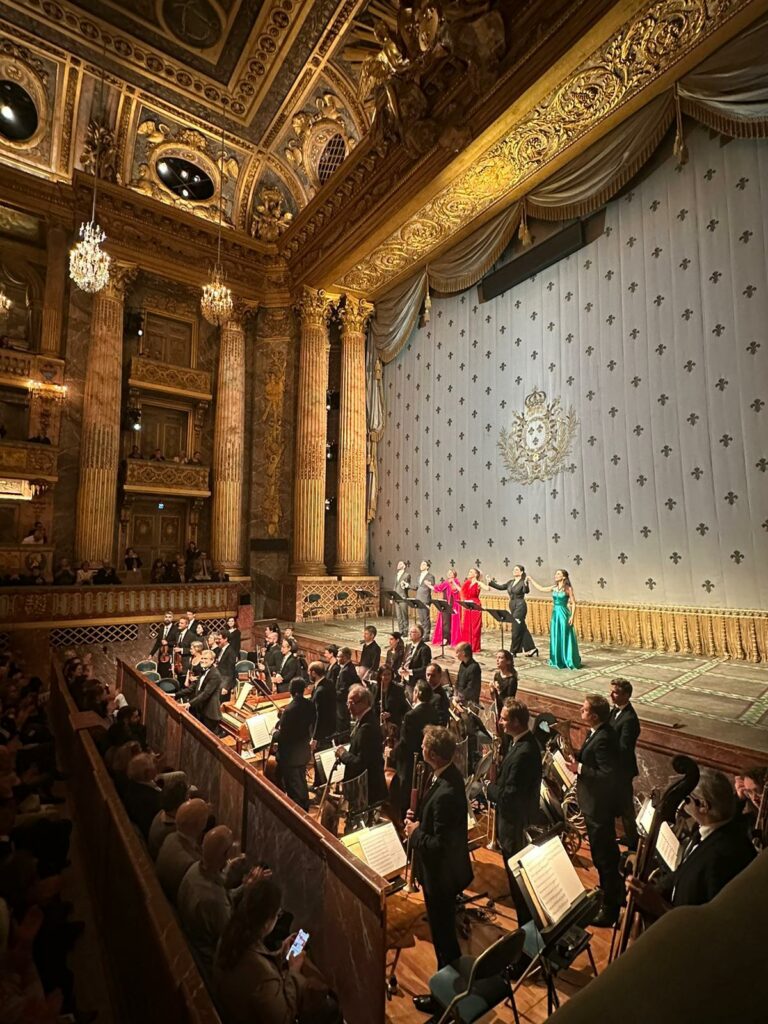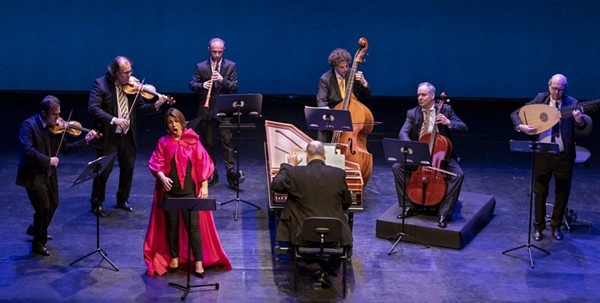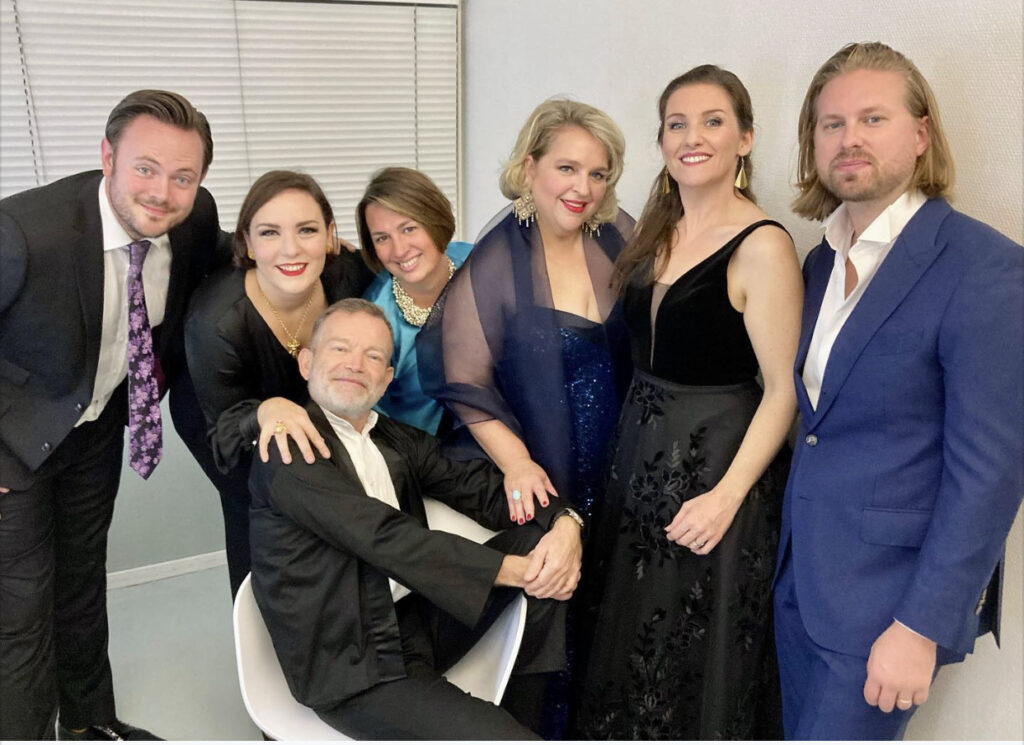
DIDO en “Dido y Eneas” de Purcell.
Teatro Principal de Palma
“Y, por supuesto, la gran Maite Beaumont, una Dido como pocas veces podemos escuchar en vivo. Su lamento, pero no solamente ese aria sublime, es superior a todos los posibles. Enorme musicalidad y exquisita presencia escénica. Sobresaliente.”
www.diariodemallorca.es, Pere Estelrich, 13.02.25
“Maite Beaumont encarnó a esta reina de destino fatídico con una mesura y un buen hacer que sólo la elegancia natural en el canto y un estudio profundo del personaje pueden aportar. Dido no hubiera soportado, después de todo, una sobreactuación”.
www.operaactual.com, Bàrbara Durán, 14.02.25

“Giovanna Seymour” en Anna Bolena de G. Donizetti/ Teatro Campoamor de Oviedo
“En mi opinión quien estuvo muy en su papel tanto vocal como dramáticamente fué la también navarra Maite Beaumont, la gran triunfadora de la noche. Ya se sabe que las mezzo tienen la mitad de aceptación popular que las sopranos pero impresionó tanto su saber estar en el escenario, comedida y muy en su papel, como su brillante intervención vocal. El dúo entre las dos mujeres, rivales sin saberlo la reina “Dio che mi vedi in cuore”, pudo ser vocalmente hablando el punto culminante de la velada. Muy bien Beaumont.”
www.plateamagazine.com, Enrique Bert, 8.09.24
“La mezzo Maite Beaumont, una Giovanna Seymour inmensa, poderosamente dulce, que enamoró como lo hacía su personaje y que jugó como alfil el papel que abría todo un desarrollo de emociones a lo largo de tres horas.”
www.operaworld.es, Pablo Álvarez Siana, 8.09.24
“Preciosas las intervenciones de Maite Beaumont como Giovanna Seymour, con una voz rotunda, de amplios agudos en su condición de mezzo y un registro muy homogéneo.”
www.codalario.com, Nuria Blanco Álvarez, 16.09.24

Olimpiade by D. Cimarosa/ Opéra Royale de Versailles
«Maite Beaumont as Megacle portrayed the depth of the character’s dilemma with a stalwart presence in her physical stillness as her warm and resonant voice worked through the virtuosity required “» www.gramophone.co.uk. Lauren McQuistin. 24/05/24
«Maite Beaumont como Megacle retrató la profundidad del dilema del personaje con una presencia inconmovible en su quietud física mientras su voz cálida y bien timbrada trabajaba a través del virtuosismo requerido”.» www.gramophone.co.uk. Lauren McQuistin. 24/05/24
«Maite Beaumont aussi n’a pas peur d’enchainer les épreuves, dès son inchantable et arrogant air d’entrée avec ses notes qui semblent percuter la portée avant d’enchaîner sur d’infinies montagnes russes de canto di sbalzo, jusque dans le passage pathétique où sa musicalité, son éloquence et la ductilité de son timbre font merveille.» www.forumopera.com, Guillaume Saintagne, 16.05.2024
«Maite Beaumont tampoco tiene miedo de dar espectáculo, desde su aria de entrada, inexpugnable y arrogante, con sus notas que parecen golpear el pentagrama antes de pasar a una montaña rusa infinita de canto di sbalzo, hasta el pasaje patético donde su musicalidad, su elocuencia y la ductilidad de su timbre son maravillosas.» www.forumopera.com, Guillaume Saintagne, 16.05.2024
Olimpiade by D. Cimarosa/Theater an der Wien
« The part of Megacle was originally written for Marchesi, one of the last seria star castrati , when the style was already shifting towards more emotional and romantic. He must have had a stunning range – and Beaumont could keep up.
She has been careful about staying in her repertoire, and her material is intact and smooth, with clear , light heights, and pleasantly sound middle and solid botton register. No uncontrolled sharpness, no gaps, responding immediately and evenly across her entire range. I was impressed.» www.qlorniette.wordpress.com, 03.04.2024
« El papel de Megacle fue escrito originalmente para Marchesi, uno de los últimos castrati estrella de la ópera sería, cuando el estilo ya estaba virando hacia un estilo más emocional y romántico. Debía de tener un registro impresionante, y Beaumont podía seguirle el ritmo. Ha tenido cuidado de mantenerse en su repertorio y su material está intacto y dúctil, con con intervalos claros y ligeros y un registro medio agradablemente sonoro y un registro grave sólido. Sin agudos descontrolados, respondiendo de forma inmediata y uniforme en toda su gama. Me impresionó.» www.qlorniette.wordpress.com, 03.04.2024

Alcina en la Maestranza, rol de Ruggiero. Orquesta Barroca de Sevilla. Dirección: Andrea Marcon
« Maite Beaumont ha demostrado en mil batallas barrocas que es
una cantante de primer nivel, una auténtica y característica voz barroca.
Su Ruggiero fue de menos a más y destacó en esas arias lentas, realmente
delicadas, que Händel escribió para este papel como Verdi Prati, selve amene.
Pero defendió perfectamente el canto de coloratura en la complicada Stà nell’Ircana
pietrosa tana. » plateamagazine.com ,Javier del Olivo, 9.02.2024
« El rol de Ruggiero (escrito originalmente para el famoso castrato Carestini)
lo resolvió muy bien la mezzo Maite Beaumont, que tiró de veteranía y esmerada
técnica para regalarnos un formidable « Verdi prati » o un melancólico « Mío bel
tesoro « dulcemente acompañada por las flautas « Ritmo.es, Javier Extremera, 13.02.2024
« Puro terciopelo el canto de Beaumont, atenta a cada matiz con su voz clara »
El Diario de Sevilla, Andrés Romero, 7.02.2024
« La mezzo navarra compensa un instrumento de timbre algo claro con una gran
musicalidad y una dulzura en el fraseo no exenta de precisión en la coloratura »
Codalario.com,José Amador Morales, 12.02.2024
« La mezzo muy lírica que es Maite Beaumont,…
… tiene bien ahormado el personaje de Ruggiero,
que dijo y expresó con ánimo y convicción. »
Beckmesser.com, Arturo Reverter, 11.02.2024

L’Incoronazione di Poppea, rol de Ottavia. Palau de la Música de Barcelona English Concert, Harry Bicket 16.03.24
“Dominadora en la extensión de su instrumento, de timbre nacarado y especialista del papel, la mezzo Maite Beaumont fue una Ottavia doliente que reinó con su icónico Addio, Roma”. www.lavanguardia.com, Jordi Maddaleno, 17.03.24

L’Incoronazione di Poppea, rol de Ottavia.
Auditorio Nacional de España, Madrid English Concert, Harry Bicket 17.03.24
“Sobresaliente Maite Beaumont , mezzo lírica con empuje, arrestos y estupenda coloratura, que hizo una Octavia de cuerpo entero , segura, firme y contundente “. wwww.scherzo.se, Arturo Reverter, 19.03.24
“De superlativa calidad vocal y fuerza dramática, la mezzosoprano española Maite Beaumont, otra de las grandes figuras de la noche, ofreció una antológica Octavia ante cuyo embriagador lirismo, su nobleza de acentos y sus perfectas ornamentaciones fue imposible no caer rendido “. www.operaworld.es, Daniel Lara, 23.03.24

Maite Beaumont y Al Ayre Español cautivan con José de Torres
Palacio Real Madrid – 05/06/2023
Maite Beaumont fue la solista perfecta que culminaba todas estas virtudes musicales, a través de su inconfundible y bellísimo timbre, buscando una expresividad que de inmediato conecta con el público. El primer recitado evidenció la transparencia absoluta en la pronunciación del texto, apoyado en la trabajada forma de los recitativos marcados de una manera concisa por López Banzo y con un bajo continuo preciso, atento a la solista y a cada palabra y fundamental en los cambios de los afectos gracias a los trabajados recursos en la articulación, dinámicas o en el número de instrumentos que en cada ocasión interviniera, uno, dos, tres o el continuo al completo.
La tercera de las arias comenzó con un original ritornello de cromatismos descendentes que dialogaban constantemente con la solista vocal. La cantada finalizó con su consiguiente Grave conclusivo, de una virtuosa escritura en donde Beaumont derrochó expresividad y mostró un generoso volumen sonoro y fuerza comunicativa, encontrándose siempre cómoda y mostrando un registro fácil en el agudo, a través de un ritmo ternario establecido de un modo seguro y natural por Eduardo López Banzo. – Simón Andueza/ ritmo.es

ALCINA/ Ruggiero
Les Talents lyriques Dir.Christoph Rousset
La Citè des Congrès de Nantes
25/10/2022
La voix ronde au timbre chaud de la mezzo soprano Maite Beaumont,
légèrement acide dans les aigus convient bien au rôle de Ruggiero (à
l’origine écrit pour un castrat alto). Elle apporte de la consistance à la
complexité du personnage, avec sa voix affirmée, bien projetée, par
l’accroche des graves et la grande précision des vocalises jaillissantes
comme un rire moqueur. Les attaques précises traduisent ses rapports
violents avec Bradamante mais elle sait aussi utiliser la messa di voce,
conduite de voix diversifiant les nuances et enrichissant les couleurs, plus
voluptueuses. Les ports de voix délicats (soutenus par les violons) pour
marquer les hésitations, et la délicatesse pianissimo des adieux qui jamais ne
perdent le soutien et le phrasé complètent la composition du personnage qui
éclate d’autant mieux dans la délivrance définitive du sortilège amoureux : la
voix est alors éclatante comme les cors qui l’accompagnent, les cascades de
vocalises confirment le triomphe de Ruggiero redevenu chevalier et ayant
retrouvé sa raison.
www.olyrix.com, Véronique Boudier, 27/10/2022
The round voice with a warm timbre of the mezzo soprano Maite Beaumont,
is well suited to the role of Ruggiero (originally written for an alto castrato).
She brings consistency to the complexity of the character, with her assertive
voice, well projected, by the grip of the low notes and the great precision of
the vocalisations gushing like a mocking laugh. The precise attacks translate
her violent relationship with Bradamante, but she also knows how to use the
messa di voce, a voice conduct that diversifies the nuances and enriches the
colors, more voluptuous. The delicate voice ports (supported by the violins) to
mark the hesitations, and the pianissimo delicacy of the farewells which never
lose the support and the phrasing complete the composition of the character
which bursts all the better in the definitive deliverance of the love spell: the
voice is then brilliant like the horns which accompany it, the cascades of
vocalisations confirm the triumph of Ruggiero become again a knight and
having found his reason.
www.0lyrix.com, Véronique Boudier, 27/10/2022
Die runde Stimme mit dem warmen Timbre der Mezzosopranistin Maite
Beaumont passt gut zur Rolle des Ruggiero (die ursprünglich für einen
Altkastraten geschrieben wurde). Sie verleiht der Komplexität des Charakters
mit ihrer durchsetzungsfähigen, gut projizierten Stimme Konsistenz, durch
das Festhalten der tiefen Töne und die große Präzision der Vokalisen, die wie
ein höhnisches Lachen hervorsprudeln. Die präzisen Attacken spiegeln ihre
gewalttätige Beziehung zu Bradamante wider, aber sie weiß auch die messa
di voce einzusetzen, eine Stimmführung, die die Nuancen diversifiziert und
die Farben bereichert, die üppiger sind. Die zarten Ports de voix (unterstützt
von den Violinen), um das Zögern zu markieren, und die Pianissimo-Zartheit
des Abschieds, die nie die Unterstützung und die Phrasierung verliert,
vervollständigen die Komposition der Figur, die umso mehr in der endgültigen
Befreiung vom Liebeszauber aufblitzt: Die Stimme ist dann strahlend wie die
Hörner, die sie begleiten, die Kaskaden von Vokalisen bestätigen den
Triumph von Ruggiero, der wieder zum Ritter geworden ist und seinen
Verstand wiedererlangt hat.
www.olyrix.com, Véronique Boudier, 27/10/2022

BODAS DE FIGARO/ Cherubino
Teatro Real. Regie.Claus Guth Dir.Ivor Bolton
Maite Beaumont, por su parte, compuso un maravilloso Cherubino, con
una voz llena de color, amplia, agudos fluidos y graves sin problemas, con
un especial cuidado en el ornamento (como la Condesa de Urbieta-Vega),
siempre centrados en el dibujo sentimental de un personaje al que la
puesta en escena convierte, merecidamente, en el gran protagonista.
www.operaactual.com, José María Marco, 26/04/2022
Maite Beaumont hat ihrerseits einen wunderbaren Cherubino komponiert,
mit einer farbenreichen Stimme, großen, fließenden Höhen und weichen
Bässen, mit einer besonderen Sorgfalt bei der Verzierung (als Gräfin von
Urbieta-Vega), immer auf die sentimentale Darstellung einer Figur
konzentriert, die die Inszenierung verdientermaßen zur großen
Protagonistin macht. www.operaactual.com, José María Marco,
26/04/2022
Maite Beaumont, for her part, has composed a wonderful Cherubino, with
a richly colored voice, large and fluid trebles and soft basses, with a
particular care for ornamentation (as the Countess of Urbieta-Vega),
always focused on the sentimental portrait of a character that deservedly
makes the production a great protagonist.
www.operaactual.com, José María Marco, 26/04/2022
„L’heure espagnole“ de M. Ravel/ Concepción
Opera de Oviedo
„En ese ingenioso híbrido entre la comedia del arte y el vodevil que es „L’heure espagnole“ cobra especial protagonismo como personaje central Concepción que interpreta magistralmente Maite Beaumont. La mezzosoprano navarra debuta en la Ópera de Oviedo y lo hace pletórica de recursos vocales y expresivos. Qué bien encarna la locura, la inquietud y las ganas de „fiesta“ del rol que, al fin, se ven aplacadas gracias al mulero Ramiro …“
La Nueva España, Cosme Marina, 6 de septiembre 2020
„In dieser genialen Kreuzung zwischen comedia dell‘arte und Vaudeville, die „L’Heure espagnole“ darstellt, ist Concepción die herausragende Protagonistin, meisterhaft interpretiert von Maite Beaumont. Die Mezzosopranistin aus Navarra gibt ihr Debüt in der Oper von Oviedo und kann dabei aus einem Überfluss an stimmlichen und expressiven Ressourcen schöpfen. Wie gut sie Irrsinn, Getriebenheit aber auch die Lebenslust der Figur verkörpert…“
La Nueva España, Cosme Marina, 6. September 2020
„In this ingenious hybrid between comedia dell‘arte and vaudeville, ‚L’heure espagnole‘as Concepción is the central character, masterfully played by Maite Beaumont. The Navarrese mezzo-soprano makes her debut at the Oviedo opera house and can rely on an abundance of vocal and expressive resources. How well she embodies the madness, the restlessness and the desire to ‚party‘ in the role which, in the end, are appeased thanks to the muleteer Ramiro …“
La Nueva España, Cosme Marina, 6 September 2020
„Farinelli“ de T. Bretón/ Farinelli
Teatro de la Zarzuela, Madrid, Februar 2020
„Como protagonista Maite Beaumont, quien debutaba en el Teatro de la Zarzuela. La mezzosoprano posee un instrumento primoroso, de límpido agudo, terso en su zona central, con un timbre bello, pequeño, coloreado, al que une una inteligencia musical de primer orden, conociendo sus capacidades. Una expresividad a flor de piel, en pro siempre del drama. No entro a comparar, porque comparar es un absurdo, pero decir que, escuchándola, pensaba cuánto le hubiese gustado cantar este Farinelli a mi adorada Teresa Berganza. Beaumont estuvo excelsa en su larga página de salida „Dejo esta estancia lúgubre y sombría”, en cuyo final, Bretón suma al personaje del padre y al coro de campesinos, impidiendo el aplauso merecido. (…) Bellísima página desplegada por Beaumont con preciosísima línea de canto, en una elevada elegancia, de sentida melancolía que, creo, no olvidaré. Nunca.“
www.plateamagazine.com, Gonzalo Lahoz, 18 de febrero 2020
„Die Hauptfigur ist Maite Beaumont, die als Farnelli ihr Debüt am Teatro de la Zarzuela gab. Die Mezzosopranistin hat ein schönes Instrument mit klarer, konturierter Mittellage und mit einem schönen, farbigen Timbre. Sie kennt ihre Möglichkeiten und setzt sie mit einer außerordentlichen musikalischen Intelligenz ein. Sie verfügt über einen sehr intensiven Ausdruck, den sie immer ganz im Sinne des Dramas einsetzt. Ich will keine Vergleiche anstellen, denn Vergleichen ist immer absurd, aber wenn ich es täte, würde ich sagen, dass ich, als ich ihr zuhörte, daran dachte, wie gerne meine geliebte Teresa Berganza diese Farinelli-Arien gesungen hätte. Beaumont begeisterte in ihre langen Eröffnungsarie: „Ich verlasse diesen düsteren und trostlosen Raum“ (…) Eine herrliche Arie, die Beaumont mit einer sehr wunderschönen, eleganten und melancholischen Gesangslinie entfaltete und die ich, glaube ich, nicht vergessen werde. Niemals.“
www.plateamagazine.com, Gonzalo Lahoz, 18. Februar 2020
„The main character is Maite Beaumont, who made her debut at the Teatro de la Zarzuela. The mezzo-soprano has a beautiful instrument with a clear, contoured middle register and a beautiful, colourful timbre. She knows her possibilities and uses them with extraordinary musical intelligence. She has a very intense expression, which she always uses in favour of the drama. I don’t want to make comparisons, because comparisons are always absurd, but if I did, I would say that when I listened to her I thought about how much my cherished Teresa Berganza would have loved to sing these Farinelli arias. Beaumont thrilled the audience with her long opening aria: „I am leaving this dark and desolate room“ (…) A beautiful aria that Beaumont sang with a very beautiful, elegant and melancholic vocal line and which I believe I will not forget. Never.“
www.plateamagazine.com, Gonzalo Lahoz, 18 February 2020
***********************************************************
„Para un acontecimiento musical de esta envergadura se requería un elenco artístico de primer nivel y eso precisamente es lo que hemos podido disfrutar. Todos han brillado a una gran altura. Por orden de importancia argumental la mezzo navarra Maite Beaumont ha hecho una auténtica creación del personaje de Farinelli. Tiene una bellísima voz, con una gran calidad, un timbre espléndido, con una tesitura amplia. Pero sobre todo es que sabe cantar, con una expresividad, con una entrega donde manifiesta su gran talento interpretativo. Su presencia en la obra es fundamental, con un protagonismo continuo lo que requiere un gran esfuerzo. Ni una sola vacilación, entregadísima en todo momento. Tengo que destacar su afortunadísima versión del aria „Dejo esta estancia lúgubre y sombría“. Todas las cualidades que posee esta cantante se han manifestado de forma espléndida en esta interpretación donde ha brillado a gran altura. Pero no solamente aquí sino en todas sus intervenciones. A la belleza de su voz y a su talento interpretativo se une una gran intensidad dramática. Francamente ha hecho un Farinelli impecable y brillantísimo.
www.operaworld.es, José Antonio Lacárcel, 21 de febrero 2020
„Ein Musikereignis dieser Größenordnung erfordert eine erstklassige künstlerische Besetzung, und genau das konnten wir genießen. Alle Interpreten haben auf höchstem Niveau geglänzt. (…) hat die aus Navarra stammende Mezzosopranistin Maite Beaumont Farinellis auf der Bühne entstehen lassen. Sie hat eine sehr schöne Stimme von höchster Qualität, mit einem herrlichen Timbre und einer großen Tessitura. Vor allem aber versteht sie zu singen, mit einer Ausdruckskraft, mit einer Hingabe, in der sie ihr großes Interpretationstalent zeigt. Ihre Bühnenpräsenz und Ausstrahlung in dieser Aufführung zeugt von großem Können. Kein einziges Zögern in der Interpretation, jederzeit engagiert. Ich muss ihre sehr glückliche Version der Arie hervorheben „Ich verlasse diesen dunklen und düsteren Raum“. Alle Qualitäten dieser herausragenden Sängerin sind in dieser Aufführung, in der sie auch in großer Höhe brillierte, wunderbar zu Geltung gekommen. (…) Zu der Schönheit ihrer Stimme und ihrem interpretatorischen Talent kommt eine große dramatische Intensität hinzu. Offen gesagt, sie hat einen tadellosen und brillanten Farinelli gegeben.“
www.operaworld.es, José Antonio Lacárcel, 21. Februar 2020
„For a musical event of this magnitude, a first-rate artistic cast was required, and that is precisely what we were able to enjoy. Everyone has shone at a great artistic height. In order of plot importance, the Navarrese mezzo-soprano Maite Beaumont has made a real creation of Farinelli’s character. She has a beautiful voice, with a great quality, a splendid timbre and with a wide tessitura. But above all, she knows how to sing, with an expressiveness, with a dedication where she shows her great interpretative talent. Her presence on stage is fundamental, with a continuous protagonism that requires a great effort. Not a single hesitation, dedicated to the music at all times. I have to emphasize her very lucky version of the aria „ I leave this dark and gloomy room“. All the qualities that this singer possesses have manifested themselves splendidly in this performance where she has shone at great heights. (…) To the beauty of her voice and her interpretative talent is added a great dramatic intensity. Frankly, he has made an impeccable and brilliant Farinelli.“
www.operaworld.es, José Antonio Lacárcel, 21 February 2020
*****************************************************
„La mezzo Maite Beaumont (Farinelli), a quien ya escuchamos recientemente en este teatro en el homenaje a Montserrat Caballé, hizo una creación de su papel, bien dibujado de sus desdichas y angustias, con gran musicalidad y sentimiento además de un agudo muy convincente.“
www.scherzo.es, Manuel García Franco, 22 de febrero 2020
„Die Mezzosopranistin Maite Beaumont (Farinelli), die wir vor kurzem in diesem Theater in der Hommage an Montserrat Caballé erleben konnte, hat ihre Rolle mit großer Musikalität und Gefühl gestaltet und der Figur – auch in all seinem Unglück und seiner Qual – ein sehr überzeugendes Profil gegeben.“
www.scherzo.es, Manuel García Franco, 22 Februar 2020
„The mezzo-soprano Maite Beaumont (Farinelli), whom we recently heard in this theatre in the homage to Montserrat Caballé, made a creation of her role, well drawn from Farinelli‘s misfortunes and anguish, with great musicality and feeling as well as a very convincing profile.“
www.scherzo.es, Manuel García Franco, 22 February 2020
****************************************
„La propia Beatriz tiene un tenso encuentro con Carlos Broschi (Farinelli) de quien la mezzo Maite Beaumont hace una creación: el papel muy bien trabajado, el personaje dibujado desde su triste y melancólica posición inicial hasta la desesperación final.“
ABC, Alberto González Lapuente, 17 de febrero 2020
„Beatriz selbst hat eine angespannte Begegnung mit Carlos Broschi (Farinelli), aus dem die Mezzosopranistin Maite Beaumont eine Persönlichkeit erschafft: die sehr gut erarbeitete Rolle zeigt eine Figur, die aus ihrer traurigen und melancholischen Stimmung zu Beginn in Verzweiflung endet.“
ABC, Alberto González Lapuente, 17 Februar 2020
„Beatriz herself has a tense encounter with Carlos Broschi (Farinelli) from whom the mezzo-soprano Maite Beaumont makes a creation: the very well prepared role, the character drawn from his sad and melancholic initial position to the final desperation.“
ABC, Alberto González Lapuente, 17 February 2020